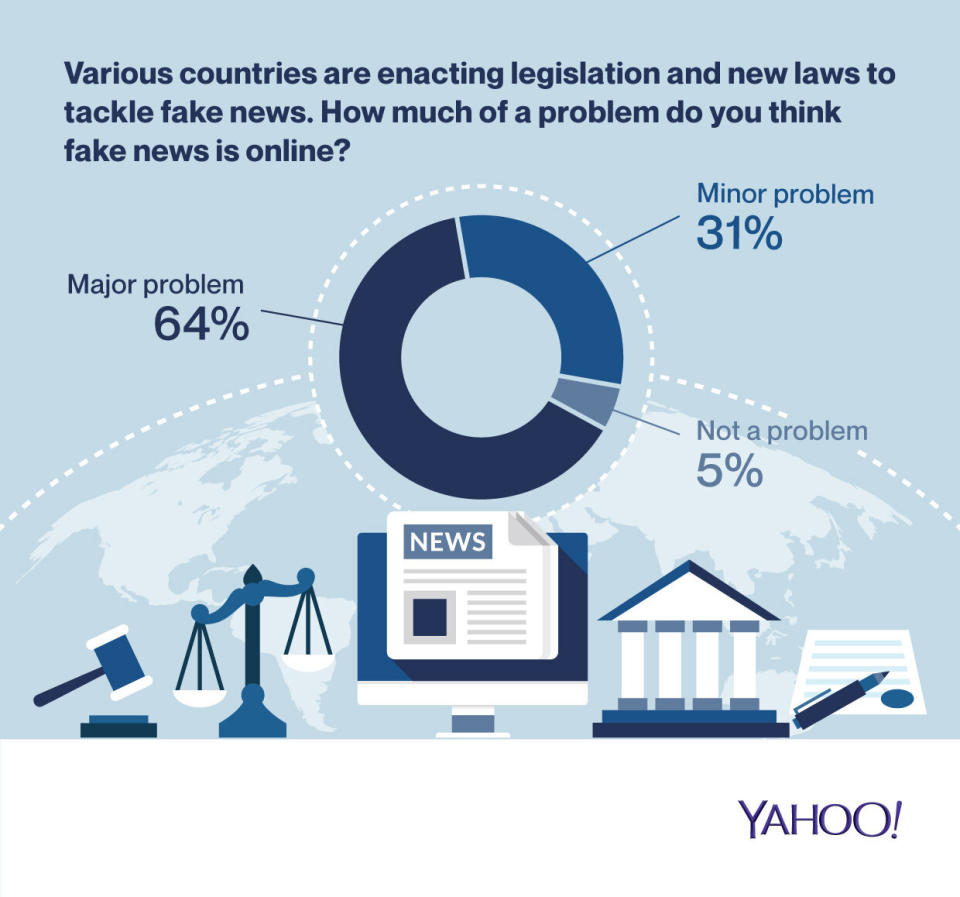60% of Singaporeans say fake news have little to no influence on their views: survey

SINGAPORE — A majority of Singaporeans believe that online falsehoods and fake news do not have much influence on their views and opinions, according to a poll commissioned by Yahoo News Singapore.
In the survey conducted by market research consultancy Blackbox Research from 20-29 April this year, 889 Singaporeans were asked, “How much of an influence do you think online falsehoods and fake news have on your own views and opinions on different issues?”
About 35 per cent of the respondents answered “a little”, while 18 per cent said “not very much”. Another 7 per cent of them said “very little/nothing at all”. These opinions represent to a total of 60 per cent of those surveyed, while the other 40 per cent answered either “a lot” or “some”.
However, fewer of the respondents (49 per cent) believe that online falsehoods do not have much influence on the views and opinions of the general community in Singapore.
About 33 per cent believe that online falsehoods have “a little” influence on the general community, while 12 per cent said “not very much” and 4 per cent said “very little/nothing at all”. The other 51 per cent of respondents answered “a lot” or “some’.
Fake news issue on the forefront
The issue of fake news came into prominence in recent months after the Singapore government tabled the Protection from Online Falsehoods and Manipulation Act (POFMA) in Parliament, seeking to protect society against the damage from deliberate online falsehoods created by malicious actors. The Act was passed on Wednesday (8 May).
Despite a majority of survey respondents believing that they are not overly influenced by online falsehoods and fake news, most of them also believe that fake news is a major problem online.

The respondents were given a statement that read, “Various countries are enacting legislation and new laws at present to tackle online falsehoods and so called fake news.”
They were then asked, “How much of a problem do you think fake news is online?”
About 64 per cent of them answered “a major problem”, while 31 per cent said “a minor problem”. Another 5 per cent said that it is “not a problem”.
Half in favour of new laws to combat fake news
Just over half of the survey respondents are in favour of governments passing new laws to combat online falsehoods and fake news.
They were asked, “Are you in favour of governments passing new laws to combat online falsehoods/fake news or do you think existing laws can be used to deal with the problem?”
Of the respondents, 54 per cent said “new laws are needed”, while 36 per cent believe “existing laws are sufficient”. Another 10 per cent said “don’t know”.
The Singapore government has said that the new POFMA law will help society guard against malicious actors who knowingly spread harmful falsehoods and act against public interest. It has stressed that the law targets falsehoods, not opinions and criticisms, nor satire or parody.
The law defines that a statement is false if it is false or misleading, whether wholly or in part, and whether on its own or in the context in which it appears.
Perpetrators face fines of between $30,000 and up to $1 million, and/or up to 10 years’ jail.
Related stories:
83% of Singaporeans prefer independent body to assess online falsehoods: survey



